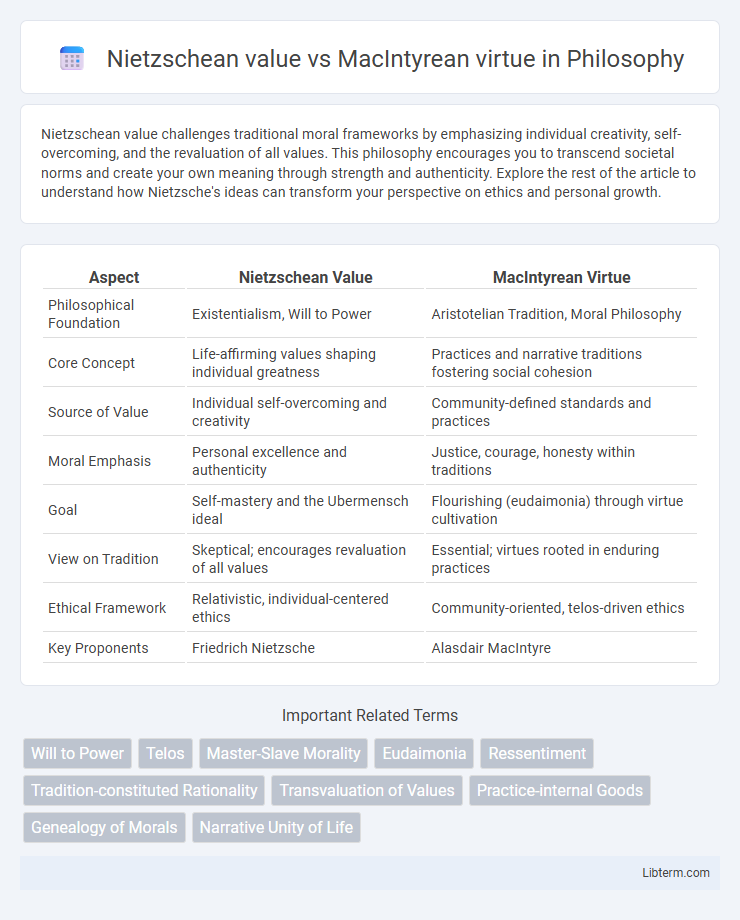Nietzschean value challenges traditional moral frameworks by emphasizing individual creativity, self-overcoming, and the revaluation of all values. This philosophy encourages you to transcend societal norms and create your own meaning through strength and authenticity. Explore the rest of the article to understand how Nietzsche's ideas can transform your perspective on ethics and personal growth.
Table of Comparison
| Aspect | Nietzschean Value | MacIntyrean Virtue |
|---|---|---|
| Philosophical Foundation | Existentialism, Will to Power | Aristotelian Tradition, Moral Philosophy |
| Core Concept | Life-affirming values shaping individual greatness | Practices and narrative traditions fostering social cohesion |
| Source of Value | Individual self-overcoming and creativity | Community-defined standards and practices |
| Moral Emphasis | Personal excellence and authenticity | Justice, courage, honesty within traditions |
| Goal | Self-mastery and the Ubermensch ideal | Flourishing (eudaimonia) through virtue cultivation |
| View on Tradition | Skeptical; encourages revaluation of all values | Essential; virtues rooted in enduring practices |
| Ethical Framework | Relativistic, individual-centered ethics | Community-oriented, telos-driven ethics |
| Key Proponents | Friedrich Nietzsche | Alasdair MacIntyre |
Introduction: Contrasting Nietzschean Value and MacIntyrean Virtue
Nietzschean value emphasizes individual power, creativity, and self-overcoming, rejecting conventional moral norms in favor of personal excellence and life-affirmation. In contrast, MacIntyrean virtue centers on grounded practices, communal traditions, and the development of moral character within a shared narrative that sustains social coherence. The fundamental divergence lies in Nietzsche's radical individualism versus MacIntyre's embeddedness of virtue within community and historical context.
Philosophical Foundations: Nietzsche’s Value Revaluation
Nietzsche's value revaluation challenges traditional moral frameworks by promoting the creation of individual values based on life-affirming power and self-overcoming rather than universal morality. This contrasts with Alasdair MacIntyre's virtue ethics, grounded in Aristotelian teleology, where virtues are cultivated within historical traditions and communal practices to achieve human flourishing. Nietzsche critiques the herd mentality of conventional virtues, urging a radical reevaluation centered on subjective strength and creativity, while MacIntyre emphasizes the role of inherited narratives and social context in defining and sustaining virtues.
Aristotelian Roots: MacIntyre and the Revival of Virtue Ethics
Alasdair MacIntyre's virtue ethics revives Aristotelian concepts of character and moral development, emphasizing community and tradition as essential for cultivating virtues. Nietzsche's value theory, in contrast, critiques traditional morality and promotes the creation of individual values through the will to power, diverging from Aristotle's teleological framework. MacIntyre reinterprets Aristotle's focus on eudaimonia by stressing narrative identity and social practices, opposing Nietzsche's radical revaluation of morality that challenges universal ethical standards.
The Role of the Individual: Nietzschean Autonomy versus Communal Narratives
Nietzschean value emphasizes radical individual autonomy, where personal power and self-overcoming define moral worth apart from societal norms. MacIntyrean virtue centers on the individual's embeddedness within communal narratives, shaping moral development through shared practices and traditions. This contrast highlights Nietzsche's focus on self-creation versus MacIntyre's emphasis on historical and social context in ethical formation.
Beyond Good and Evil: Nietzsche’s Critique of Traditional Morality
Nietzsche's *Beyond Good and Evil* challenges traditional morality by rejecting absolute values and promoting the revaluation of all values grounded in individual will to power, contrasting sharply with MacIntyre's Aristotelian virtue ethics that emphasize communal narratives and practices for moral development. Nietzsche critiques the herd morality epitomized by Christian ethics, advocating for the creation of personal values beyond conventional good and evil. MacIntyre, conversely, situates virtues within social contexts and historical traditions, highlighting character formation through shared practices, thereby opposing Nietzsche's radical subjectivity in value creation.
Practices and Traditions: MacIntyre’s Account of the Virtuous Life
MacIntyre's account of the virtuous life emphasizes practices as coherent social activities with internal goods that cultivate virtues within established traditions. In contrast, Nietzschean value prioritizes individual will to power and the creation of personal values often independent of communal or historical constraints. MacIntyre argues that virtues attain meaning and direction through participation in shared traditions, fostering a narrative identity that Nietzsche's value theory typically critiques for its lack of communal grounding.
Moral Authority: Will to Power vs. Social Practices
Nietzschean value centers on the Will to Power as the ultimate source of moral authority, emphasizing individual self-overcoming and the creation of personal values beyond conventional morality. MacIntyrean virtue derives moral authority from the embeddedness of virtues within social practices and traditions, where communal narratives shape ethical understanding and guide moral development. The contrast highlights Nietzsche's focus on autonomous self-assertion versus MacIntyre's emphasis on historical continuity and collective life in grounding virtue.
Perspectives on Excellence: Becoming vs. Belonging
Nietzschean value emphasizes self-overcoming and the cultivation of individual excellence through a continuous process of becoming, highlighting personal growth and transformation as central to virtue. MacIntyrean virtue, in contrast, prioritizes belonging to social practices and traditions where excellence is defined by communal standards and the fulfillment of shared narratives. This distinction frames excellence either as an evolving personal journey or as adherence to the virtues upheld within a community's moral framework.
Criticisms and Challenges: Debating Nietzsche and MacIntyre
Nietzschean values emphasize individual will to power and self-overcoming, often criticized for promoting moral relativism and elitism, which challenges universal ethical standards. MacIntyrean virtue ethics counters by advocating tradition-based communal virtues rooted in Aristotelian teleology but faces criticism for cultural particularism and resistance to moral pluralism. The debate highlights tension between Nietzsche's radical individualism and MacIntyre's communitarian framework, raising fundamental questions about autonomy, moral objectivity, and social coherence.
Conclusion: Toward a Dialogue between Value and Virtue
Nietzschean value emphasizes individual self-overcoming and the creation of personal meaning, while MacIntyrean virtue centers on communal practices and traditions that sustain moral character within a narrative framework. Bridging these perspectives fosters a dialogue that integrates Nietzsche's dynamic, transformative ethos with MacIntyre's emphasis on social context and moral development. This synthesis encourages an enriched ethical understanding where personal excellence flourishes alongside communal integrity.
Nietzschean value Infographic

 libterm.com
libterm.com